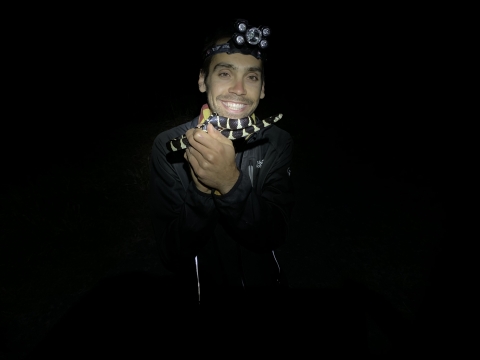From creating art pieces about lizards as a child to now working to conserve those same environments for wildlife, Alejandro Grajal-Puche is making his mark in agriculture. Alejandro Grajal-Puche, Phoenix Chapter Scholar (2021-23), is using his PhD in Biology at Northern Arizona University to improve farming habitats with the data he finds in rice field ecosystems.
“I have this PhD project looking at ways that we can make rice farming more sustainable by improving biodiversity in rice fields, and the study will be conducted in Vietnam,” explains Alejandro. “I love food and conservation is my ultimate goal. We started the first year and everything was golden, then the pandemic hit and sort of derailed it. But we pivoted now, and most of all my data has been collected in rice fields in California.”
For the past two years, Alejandro has been collecting data from these rice fields to answer questions such as what animals are there? Are there differences between conventional and organic rice fields? He found there was a greater abundance of diversity in organic farms compared to conventional farming. Organic rice farms control weeds and pests by drawing down the water levels in their rice fields. To solve the same problem, conventional farmers use herbicides, fungicides, and insecticides throughout the year to control pests.
Alejandro explains why pesticides are bad for humans and farming, “they [the pesticides] have negative outcomes on humans. Many studies have pointed out that an increase in pesticide use in agriculture has been correlated with many negative health outcomes. And now there’s pesticide resistance. Even though we have increased the amount of pesticide use, yields have plateaued, and cost goes up.”
Alejandro seeks to answer the question, “Is there a way to produce rice that’s sustainable for humans and wildlife?” His research answers with a yes. Organic farms have more diversity, frogs, and fungi than conventional farms, which led Alejandro to research how these differences could provide services to farmers.
Alejandro’s research supports his theory that organic farms have the diversity necessary to provide the same benefits as the herbicides and pesticides conventional farms use. His hope for his data is to share the differences with farmers and incentivize government or state agencies so that less input is used in rice fields.
Receiving the ARCS Scholar Award allowed Alejandro to continue to pursue his PhD and seek answers to all the questions he has about supporting biodiversity within agricultural landscapes. Without the ARCS Scholar Award, he only had funding for one year. “ARCS supported me and allowed me to continue. It paid for my whole last summer and allowed me to collect data in these rice fields and allowed me to ask more questions about these unique manmade systems,” Alejandro shares.
It's for these reasons Alejandro believes ARCS gave him freedom. “ARCS has been freedom, freedom to explore and think. With ARCS support, you can focus on the research and explore what you want to. It allows students to think outside the box and develop more thorough research projects” he concluded.

